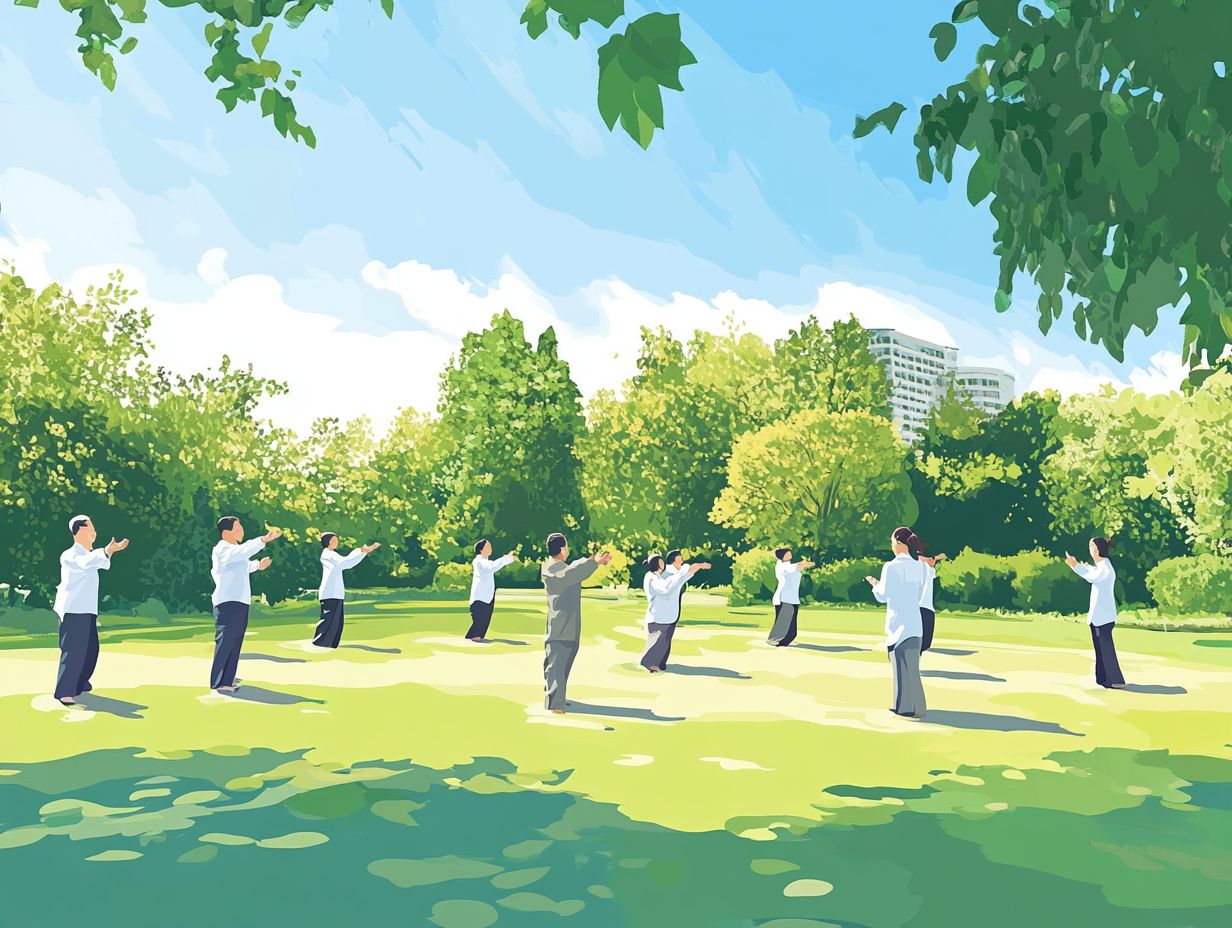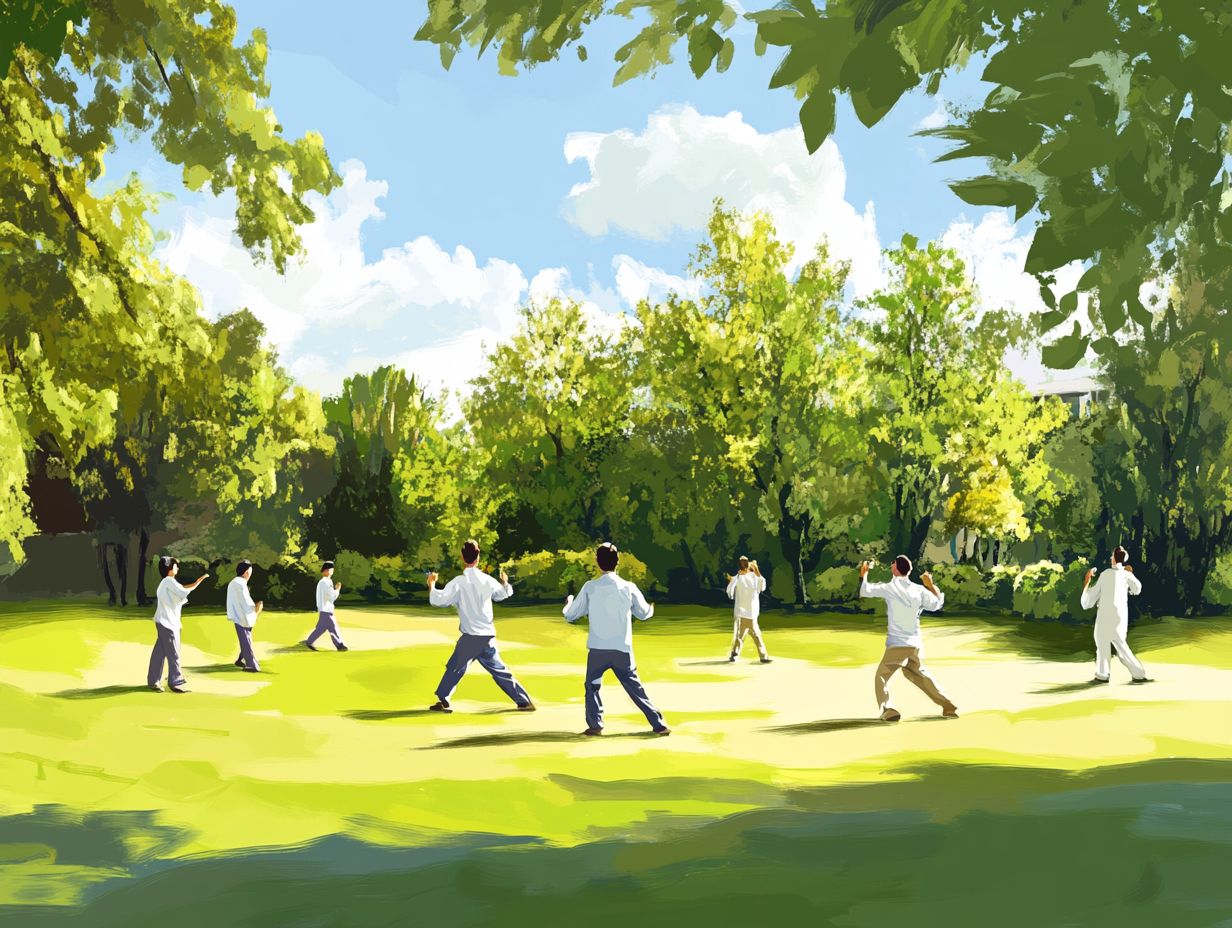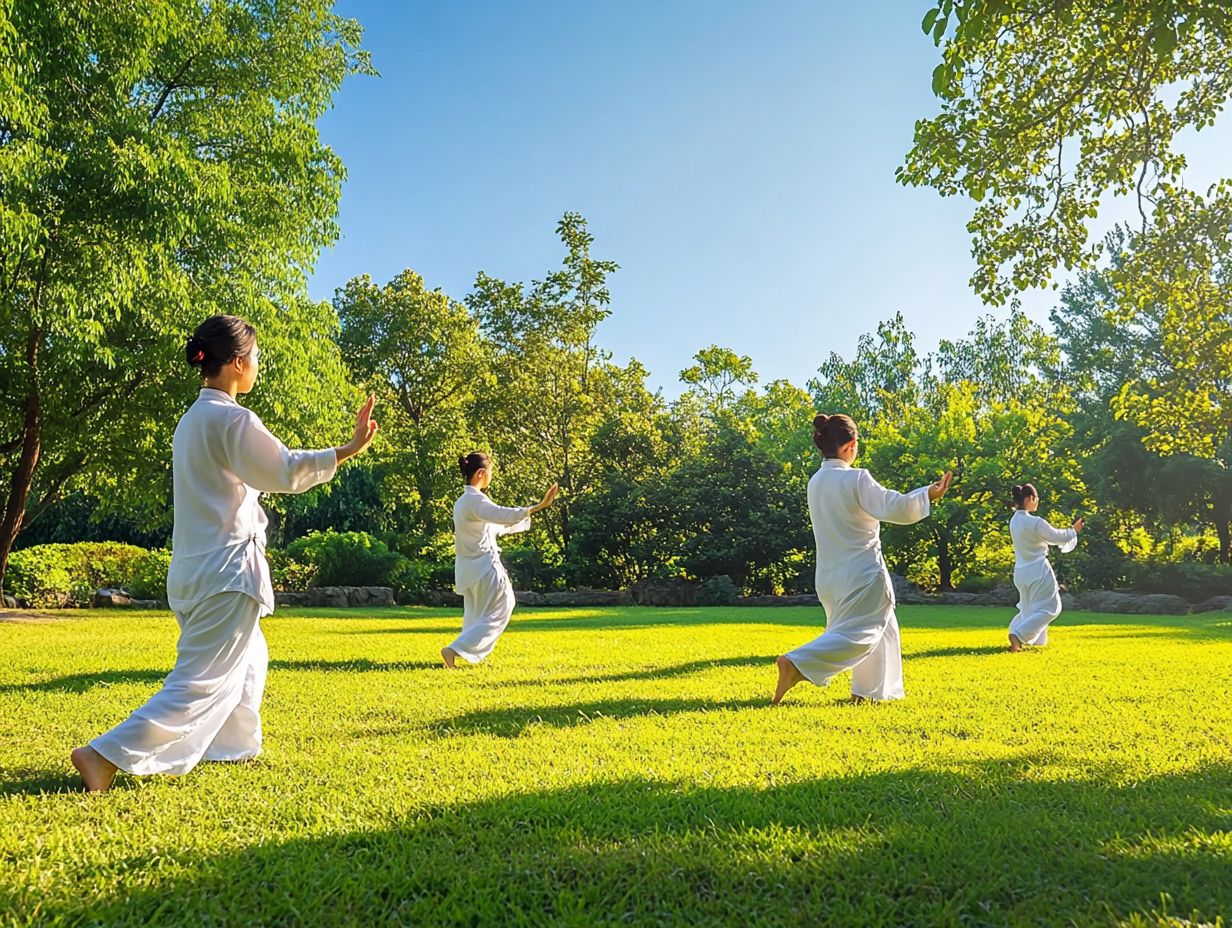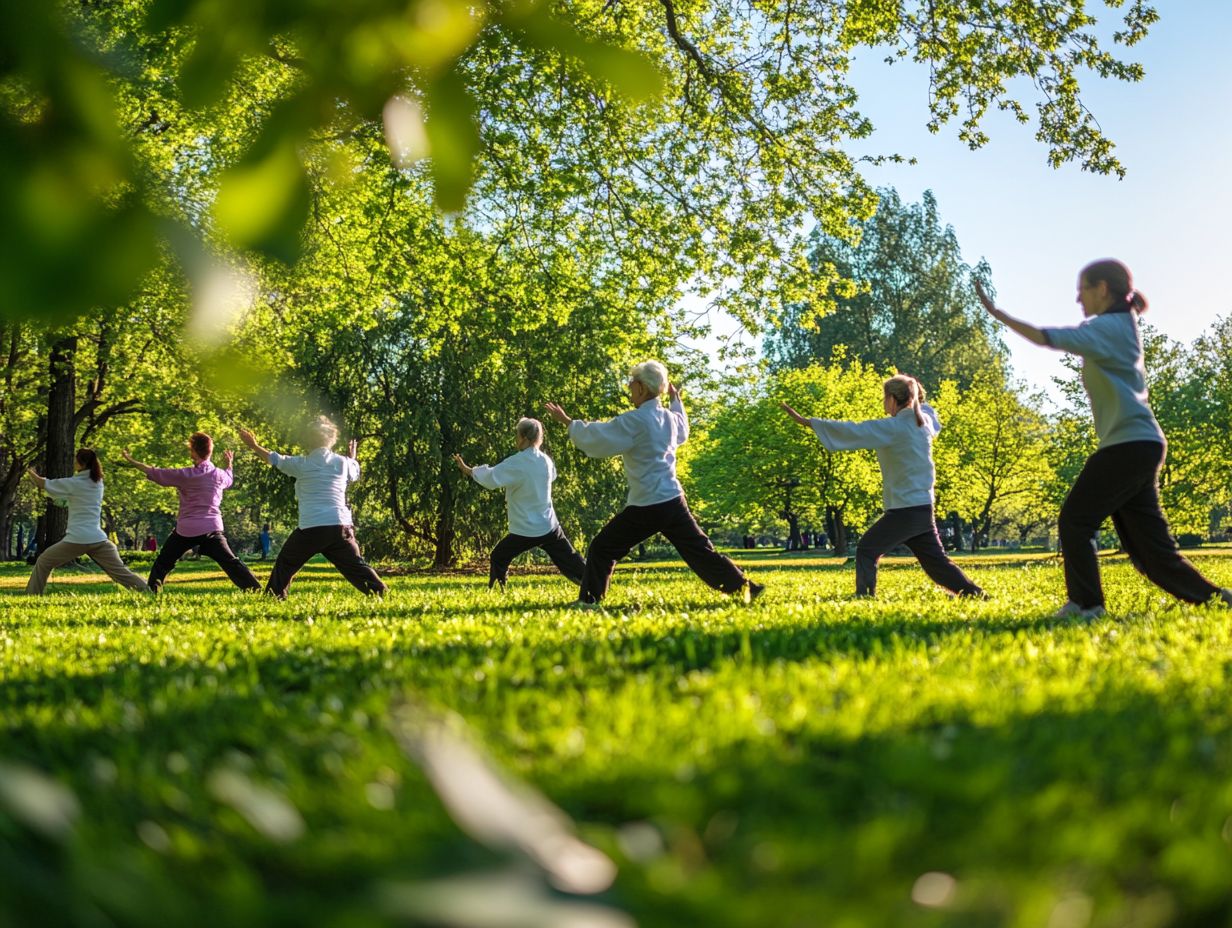Exploring Tai Chi for Relaxation Benefits
Tai Chi, often referred to as “meditation in motion,” offers you a profound mind-body connection that fosters relaxation and enhances your overall well-being.
This ancient practice combines gentle movements with deep breathing, making it an exceptional tool for alleviating stress and sharpening mental clarity.
You ll discover the many benefits of Tai Chi, from its soothing effects on the mind to its remarkable physical advantages.
We will explore how to easily incorporate Tai Chi into your daily life, along with tips to maximize its calming potential.
Whether you’re new to Tai Chi or looking to deepen your practice, you’re in for a treat! This ancient art offers incredible ways to find peace and balance in your life.
Contents
Key Takeaways:

- Tai Chi is a mind-body exercise that promotes relaxation and improves overall well-being.
- Practicing Tai Chi regularly can reduce stress, improve mental health, and provide physical benefits like improved balance and flexibility.
- Incorporating Tai Chi into your routine can be done through at-home practice or joining a class, focusing on proper techniques, mindset, consistency, and patience.
What is Tai Chi?
Tai Chi is a traditional Chinese martial art that invites you to embrace slow, deliberate movements intertwined with deep breathing and mindfulness. This practice enhances your overall well-being and balance. Rooted in ancient Chinese medicine, Tai Chi taps into the concept of Qi, the life energy within us, to elevate both physical and mental health. It is particularly advantageous for individuals of all ages, especially those seeking gentle exercise to improve body balance and coordination.
With a rich history steeped in various philosophical and spiritual traditions, including Taoism and Confucianism, Tai Chi offers a profound connection to the past. The gentle, flowing movements are crafted to cultivate inner harmony, allowing your body to become a vessel for Qi to circulate freely. Each form in Tai Chi presents a unique sequence of postures that enhance flexibility and strength, fostering relaxation and mental clarity.
As awareness of its many health benefits spreads, more individuals are weaving Tai Chi into their daily routines and discovering its invaluable role in stress reduction, improved focus, and overall wellness.
The Mind-Body Connection in Tai Chi
The mind-body connection in Tai Chi is a crucial element that cultivates mental health and emotional well-being. It showcases the profound effects of mindful movement on stress relief and overall vitality.
As you engage in Tai Chi, you ll cultivate a deeper awareness of both your body and mind, helping you integrate physical exercise and mental focus that fortifies your emotional resilience.
How Tai Chi Promotes Relaxation
Tai Chi guides you toward relaxation through a thoughtfully structured approach that emphasizes deep breathing alongside a focus on your body s movements. This practice allows you to release tension and cultivate a serene state of mind. By incorporating techniques such as intentional breathing and gentle, flowing motions, Tai Chi becomes a form of moving meditation that calms your nervous system and reduces stress levels.
As you engage in this practice, you ll learn to synchronize your breath with each deliberate movement, enhancing oxygen flow throughout your body while inviting a profound sense of tranquility. The slow transitions between postures encourage mindfulness, inviting you to tune into your physical sensations and fostering a deeper connection with your inner self.
This heightened awareness can lead to improved physiological responses, such as lower heart rates and reduced cortisol levels. Ultimately, this contributes to greater mental clarity and emotional stability. By nurturing this balance, you may find yourself better equipped to navigate the challenges of daily life with grace and composure.
Experience the calming benefits of Tai Chi start your journey to relaxation now!
Benefits of Tai Chi for Relaxation
The benefits of Tai Chi for relaxation reach far beyond simple physical exercise. They offer profound enhancements to your mental health and overall well-being.
Engaging in regular Tai Chi practice is linked to numerous health advantages, such as lowered anxiety levels and improved focus. This makes it an invaluable tool for stress relief, helping you cultivate a serene and peaceful mind.
Stress Reduction and Mental Health Benefits

Practicing Tai Chi is a powerful way to significantly reduce stress and enhance your mental health. It is especially effective for those navigating anxiety or depression.
Numerous studies illustrate that engaging in this gentle form of exercise lowers anxiety levels and boosts your mood, contributing to a healthier mind.
A study published by the American College of Rheumatology found that participants who practiced Tai Chi regularly experienced an impressive 30% reduction in stress levels. The meditative movements and focused breathing techniques invite relaxation and mindfulness.
Incorporating Qigong exercises, which emphasize energy flow and balance, can amplify these benefits even further. The CDC recognizes that practices like Tai Chi can lead to significant improvements in mental health outcomes, making it a valuable tool for tackling the challenges of modern life.
Physical Benefits
The physical benefits of Tai Chi are extensive. You can enjoy improved muscle strength, flexibility, and balance, all key elements for overall fitness and mobility.
This gentle exercise enhances your coordination and reduces the risk of falls, making it especially valuable for older adults and those facing health challenges.
As you engage in Tai Chi routines, the slow, controlled movements effectively strengthen various muscle groups. Each posture encourages lengthening and stretching, promoting flexibility and joint health.
For older adults, these exercises are essential for maintaining balance and stability, both critical factors in fall prevention.
Take the Grasp the Bird s Tail routine, for instance. It involves shifting your weight and emphasizing grounding, reinforcing your core stability.
Regular practice will lead to improved mobility, support joint health, and foster relaxation contributing to your overall well-being and fitness, particularly for those managing chronic conditions.
How to Incorporate Tai Chi into Your Routine
Incorporating Tai Chi into your daily routine can transform your experience. This practice offers both physical exercise and mental relaxation.
Just a few minutes of Tai Chi each day can dramatically change your life! Experience better balance, stronger muscles, and less stress.
Practicing Tai Chi at Home
Practicing Tai Chi at home is not just about convenience. It s an opportunity to cultivate a profound connection with your movements and breathing, enriching your overall experience.
Create Your Space
By carving out a dedicated space and incorporating deep breathing techniques, you can engage in mindful movement that promotes relaxation and enhances your body s balance. Select a serene area free from distractions, where the ambiance encourages tranquility.
Consider soft lighting, perhaps even candles or natural elements, to craft an inviting atmosphere that welcomes you.
Use Online Resources
Leverage various online resources, like instructional videos, apps, or beginner-friendly DVDs, to guide you in mastering technique and form. Remember, consistency and patience are key; setting aside regular time slots for practice can significantly boost your progress.
Start your Tai Chi journey today! Your future self will thank you.
Joining a Tai Chi Class
Joining a Tai Chi class is a great opportunity to learn from experienced teachers, improve your coordination, and connect with a community of like-minded practitioners who share your health and wellness goals. Participating in group classes gives you immediate feedback and fosters a sense of camaraderie, which can significantly boost your motivation and commitment to practice.
In these classes, expect a structured environment that emphasizes proper techniques, ensuring your movements are safe and effective. Many instructors offer personalized guidance, allowing you to progress at your own pace, especially beneficial if you re new to the practice.
To discover local classes or workshops, explore community centers, yoga studios, or online directories focused on health and wellness. For newcomers, it s helpful to arrive early; this gives you a chance to observe and engage with instructors, easing any initial nerves.
Engaging in this complete practice nurtures your body and cultivates mindfulness, leading to improved mental clarity and overall well-being.
Tips for Getting the Most Out of Tai Chi for Relaxation

To truly harness the benefits of Tai Chi for relaxation, concentrate on refining your techniques and cultivating the right mindset. Embrace mindfulness and awareness during your practice.
By treating Tai Chi as moving meditation, you can deepen your relaxation and enhance the experience of calming both your mind and body. Additionally, exploring the benefits of warm baths for relaxation can further complement your practice.
Proper Techniques and Mindset
Getting the techniques right is crucial for enjoying Tai Chi! Mindful movement and a focused mindset significantly enhance your relaxation and well-being. Pay close attention to your body alignment (how your body is positioned during practice), breath control, and the flow of movements to ensure a fulfilling practice that nurtures both your mind and body.
A grounded posture creates stability, enabling smooth transitions between various forms. Breath control is equally crucial; it connects your mind and body while promoting deeper relaxation. When you embody a mindful approach, your practice transforms into a meditative experience.
Common obstacles, like wandering thoughts or distractions, can disrupt mindfulness. To overcome these challenges, incorporate gentle reminders, such as mantras, or focus on rhythmic breathing patterns, helping you stay present and engaged throughout your session.
Consistency and Patience
Consistency and patience are essential for successfully integrating Tai Chi into your life. Progress in relaxation and physical ability unfolds gradually, so embracing this journey is key. Approach your practice with an open mind and commit to regular sessions for deeper relaxation and effective exercise goals.
Establishing a consistent practice schedule sharpens your physical skills and enhances mental focus, leading to a more enriching experience. Set achievable goals today to see real progress tomorrow, whether it s improving balance, reducing stress, or enhancing your well-being.
When motivation dips, introduce variety into your routines or team up with a fellow Tai Chi enthusiast to reignite your enthusiasm. Celebrate small victories, like mastering a new pose or noticing increased flexibility, to boost your confidence and remind you of your progress.
Ultimately, patience becomes your steadfast ally, nurturing resilience and reinforcing the joy from embracing this ancient art.
Frequently Asked Questions
What is Tai Chi and how can it benefit relaxation?
Tai Chi is an ancient Chinese martial art that combines slow, fluid movements with deep breathing techniques and mental focus. Its gentle and meditative nature helps reduce stress and anxiety while promoting relaxation.
Is Tai Chi Suitable for Everyone?

Yes, Tai Chi is for everyone! People of all ages and fitness levels can enjoy its benefits. It s a low-impact exercise that can be tailored to meet individual needs.
How Does Tai Chi Promote Relaxation?
Tai Chi features slow, controlled movements combined with focused breathing. This approach helps to reduce stress and tension, creating a calming effect on both the mind and body.
Can Tai Chi Improve Sleep Quality?
Absolutely! Regular Tai Chi practice can significantly enhance sleep quality, especially for those struggling with insomnia or sleep disorders.
Its peaceful movements help to relax the mind and body, paving the way for better sleep.
What Are the Other Benefits of Practicing Tai Chi?
Beyond relaxation, Tai Chi also improves balance and flexibility. It contributes to overall physical and mental well-being, boosts mood, and elevates energy levels.
Plus, it can help reduce symptoms of depression and anxiety.
Do I Need Special Equipment to Practice Tai Chi?
No special equipment is required! Just wear loose, comfortable clothing and find an open space. Some might opt for a Tai Chi mat for extra cushioning, but it s not necessary.






